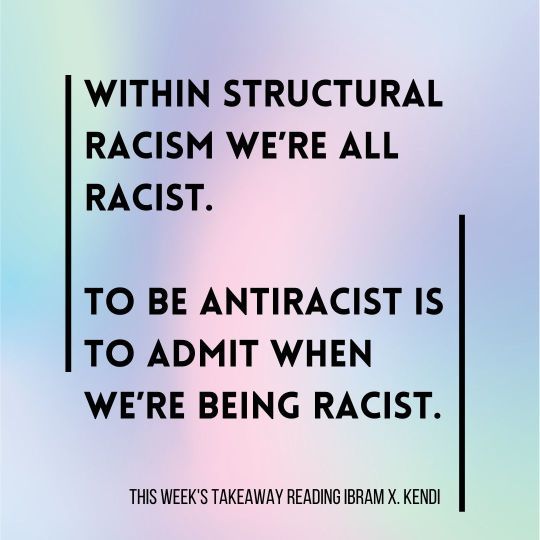Journaling with Suzanne begins
I used to think that because I’m part of a multi-racial, multi-ethnic family and circle of friends, am educated and read a lot I wasn’t prejudiced, discriminatory, and certainly not racist. But I am part of a system that is racist, and within that system I’m racist, you’re racist, our bosses, mentors, idols and icons are all racist.
Many people find this confronting, because we want to be good, nice people, and we’ve been taught to believe racists are bad people. But understanding racism as a system frees us to see racism differently: not as something only bad people are involved in, but something we are all in and all need to work on together to dismantle.
In structural racism we all commit acts of racism. Change requires us to see it, and admit it.
“The heartbeat historically of racism has been denial. By contrast, the heartbeat of antiracism is confession, is admission, is acknowledgement, is the willingness to be vulnerable, is the willingness to identify the times in which we are racist, is to be willing to diagnose ourselves and our country, our ideas and our policies. And the reason why that’s the heartbeat is because, like anything else the first step is acknowledging the problem. We can’t even begin the process of changing ourselves, of acting in an antiracist fashion if we’re not able to admit the times we’re being racist. I realized, essentially to be antiracist is to admit when we’re being racist.” Ibram X. Kendi, author of How to Be an Antiracist, in conversation with Brené Brown.
“If I understand racism as a system into which I was socialized, I can receive feedback on my problematic racial patterns as a helpful way to support my learning and growth.” Robin DiAngelo, White Fragility: Why It’s So Hard for White People to Talk about Racism.
Journaling question: What can I acknowledge to myself today about race and racism?

The PROCESS blog
- Suzanne Alyssa Andrew's profile
- 21 followers



